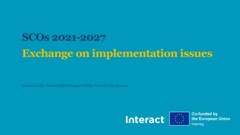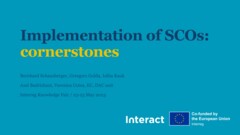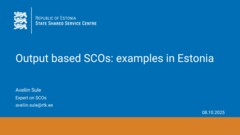Simplified Cost Options
Even though we do not encourage using abbreviations, you will not find a single person in your programme who does not know what the term SCOs stands for (if you do, make sure to give them the link to this page dedicated to simplified cost options).
Using SCOs is one of the key methods of simplifying the implementation of projects, programmes, control and audit procedures within a programme.
Where SCOs are used, the eligible costs are calculated according to a predefined method based on outputs, results or some other costs clearly identified in advance either by reference to an amount per unit or by applying a percentage.
This enables Interreg programmes and institutions involved to significantly reduce the administrative burden, focus on results, rather than tracing every euro. Finally, SCOs contribute to a more correct use of the programme funds (performed audits continuously show lower error rate).
Where to start
If you are new to SCOs, Interact launched a certified training dedicated to SCOs under the aegis of the Interact Academy. The training will introduce you to SCOs world and their utilisation in the Interreg environment. This is the mandatory position on your to-do list if you are the SCOs newbie.
As you may be aware, there are three types of SCOs- lump sums, unit costs and flat rates. They can be established in 5 different ways. For certain types of projects SCOs are the mandatory option to use. SCOs can be also used in combinations with real costs or with other SCOs. They can be used not only by programme beneficiaries but also by the EC to reimburse resources to programmes. If you are interested in programme practices please have a look at the collection of SCOs used by all Interreg programmes.
Would you like to know more?
Please visit out dedicated SCOs Interreg community and the library where you can find lots of interesting materials, programme experiences, tips and exchanges related to the topic.
What we are working on
Interact offers various dedicated events focused on SCOs where practitioners have an opportunity to exchange on implementation challenges and experiences. In 2025 we will continue collecting the best practices, interesting programme specific SCO examples to foster simplifications provided by SCOs and expand the knowledge and experience of Interreg programmes. We also hope that with this we will improve the framework of SCOs in the future.
In May we organized a dedicated SCOs session during a two-day InterFin event. You can find materials from this session and the others HERE in the Interact library.
In the second half of the year, October 7-8 we plan our SCOs dedicated online webinar. Apart from usual updates , this time we plan to focus discussions around output based SCOs, lessons learned from first SCOs audits, SCOs in Jems, post2027 SCOs. If these sound interesting, please pencil the date in your calendar and join us these days. Please feel free to contact us, if you want to discuss some specific topic. We plan to share the agenda and open the registration for the event in August.
During the the 2025 we will conclude works on the Manual on the draft budget method.
There is one more publication in our heads bringing together SCOs and Risk-Based Management Verification.
After changing to the new Portal we are currently working on transferring relevant materials from the old SCOs community to the new SCOs channel. This work is scheduled for the summer time. Please bear with us, by september 1, the work should be completed.
Last but not least, under Interact Academy project we designed two SCOs certified trainings. One for SCOs newbies, another dedicated to practitioners. The training for newbies has been turned into the self enrolled Certified Course. We hope that with the new format it will become more accessible and user friendly. You can register for the course HERE.
Contact
For more information please contact Grzegorz Golda.
Want to exchange on this topic?
Interact offers an online space for those working with SCOs in Interreg and wider Financial programme management to share information and exchange. You can find out more about our MS Teams environment on our Networks page, and see all our networks in our Portal.
If you would like to learn more about this, please contact Grzegorz Golda.
Additional resources
Briefing note | Manual on the draft budget method
Update 2025_Verification of SCOs – practical implications
Factsheet Reusing SCOs from Union Policies
Template | Appendix 1 a mock-up example
Roadmap for a programme specific SCOs
Simplified Cost Options – legal references
Interreg SCOs 2021-2027 - Collection
Preparation costs Lump sum report









